Tutor and Student
Both a Teacher and a Friend
The emperor's teacher was known as the Imperial Preceptor and was widely respected. In 1919, Reginald Johnston (1874-1938) became the 13-year-old Puyi (1906-1967)'s tutor behind the vermilion walls of the Forbidden City. Johnston was both a teacher and a friend to the last emperor and bore witness to the tangled complexity of emotions he experienced in the midst of great times.
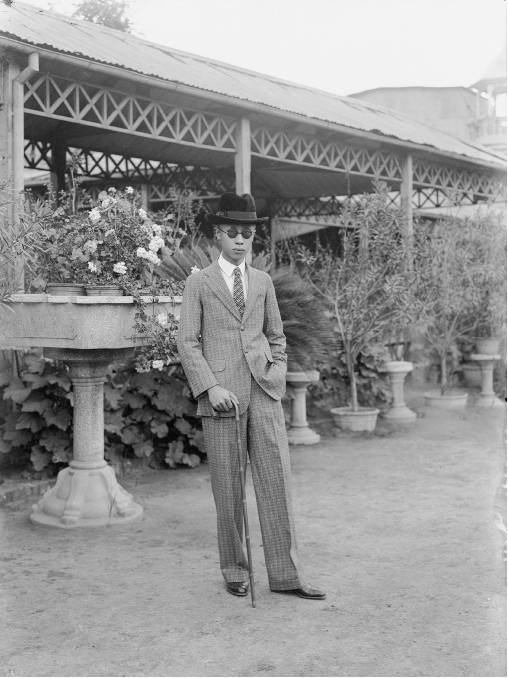
Johnston
to
Puyi
Puyi
to
Johnston
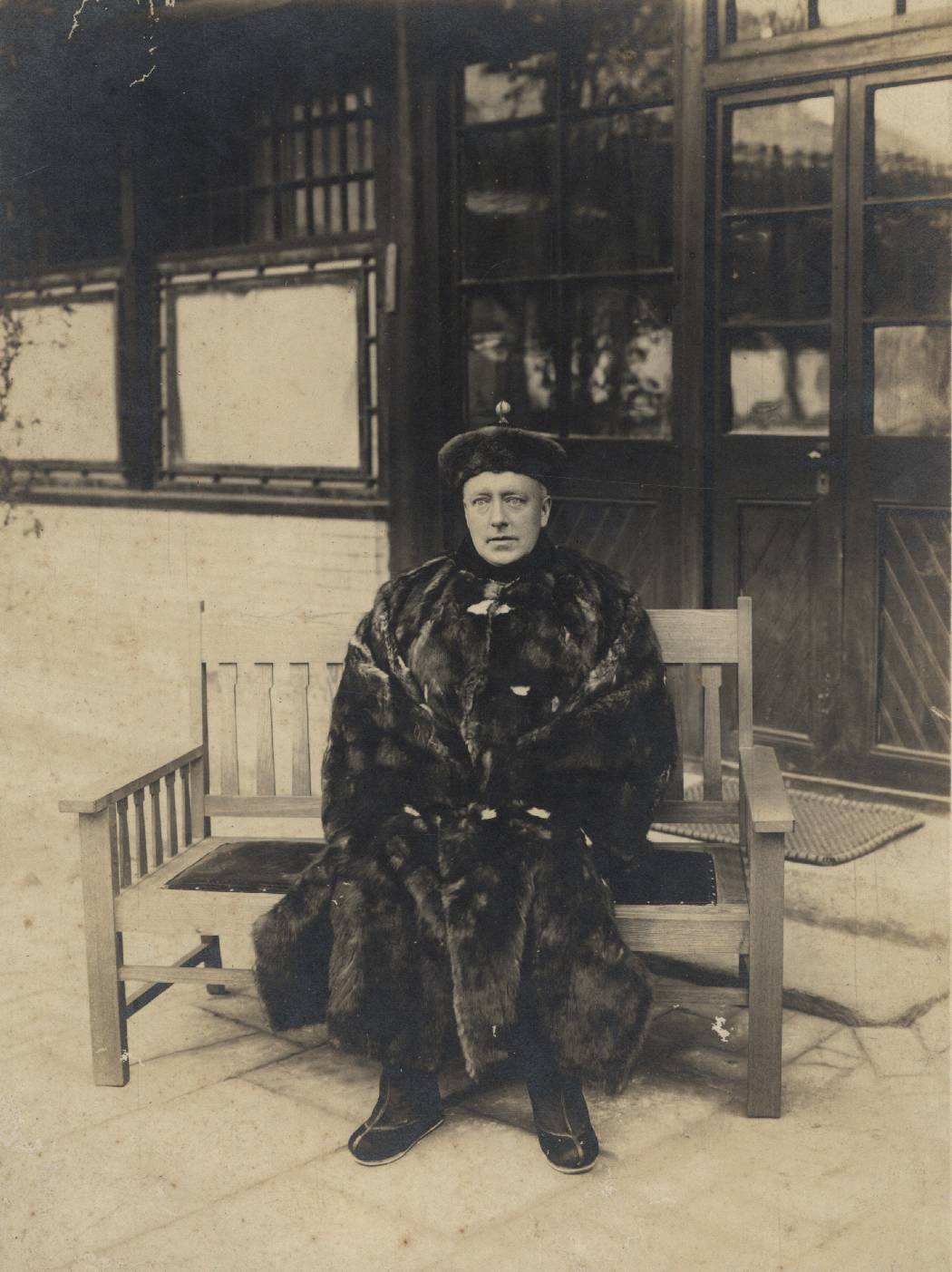
Johnston
to
Puyi
Reginald Johnston was a Scottish academic who graduated from the University of Edinburgh and Oxford University. He came to China in 1898, working and travelling in Hong Kong, Shandong and many Asian cities. With his wealth of knowledge, he opened Puyi's eyes to the world beyond the vermilion walls, introducing him not only to Western history, culture, technology and military knowledge, but also various personages.
The Forbidden City 100: The Forbidden Imperial Garden
Retrieved from the CCTV Documentary channel on YouTube

Photo of Puyi and Rabindranath Tagore at the Forbidden City, 1924
Provided by the Palace Museum
Johnston read a poem by Rabindranath Tagore (1861-1941) to Puyi, prompting a meeting between the two.


Telephone Set, Republic of China
Provided by the Palace Museum
In his autobiography*, Puyi wrote, "When I was fifteen, an explanation from Johnson of the uses of the telephone aroused my curiosity… I told the Household Department to have one installed in the Hall of Mental Cultivation." Later, Puyi gave Hu Shi (1891-1962) a call at Johnston's introduction, "I had been told about this Doctor Hu Shi, the champion of writing in the vernacular language, by my tutor Johnston." After seeking confirmation from Johnston, Hu Shi was granted an audience with Puyi in the Forbidden City.
*Puyi (2008), The First Half of My Life. Beijing: Beijing United Publishing Co. Ltd., Ch. 3.


Photo of Puyi, Wanrong, Johnston and the Canadian Governor General Lord Willingdon and his wife, Republic of China
Provided by the Palace Museum
The Canadian Governor General Willingdon and his wife had an audience with Puyi and Wanrong (1906-1946) through Johnston's referral.


Puyi wearing Western clothing, Republic of China
Provided by the Palace Museum
In his autobiography*, Puyi mentioned that when he was fifteen, he sent his eunuchs to the streets to buy Western clothing so he could dress in the manner of an English gentleman like Johnston. The outfit was too big for him and he wore his tie hanging outside his collar like a length of rope. Johnston exploded with anger at the sight as he considered a person wearing ill-fitting clothes not a gentleman but a "beggar boy". He brought in a professional tailor the next day to take Puyi's measurements and make him a custom suit.
*Puyi (2008), The First Half of My Life. Beijing: Beijing United Publishing Co. Ltd., Ch. 3.



Puyi playing with a pocket watch, Republic of China
Provided by the Palace Museum
In contrast to Puyi's eagerness to westernise, Johnston had a high appreciation of Chinese culture and wanted Puyi to preserve and pass on traditions. On his wedding day, Puyi wore a Western-style hunting outfit that was unbefitting of his status and was inadvertently seen by Johnston's foreign friends. Johnston was furious when he found out and exasperatedly admonished him.


Photo of Johnston with Puyi, Pujie and Runqi in the imperial gardens, Republic of China
Provided by the Palace Museum
Johnston often played with Puyi and the other members of the imperial family in the imperial gardens. Puyi asked Johnston to give him the foreign name "Henry". Not only did Puyi give his siblings foreign names, he also gave his wife Wanrong the name "Elizabeth". He even spoke in a mixture of English and Chinese, "William (Pujie (1907-1994)), sharpen this pencil for me… good, put it on the desk. Arthur (Pujia (1908-1979)), tell Lily (my third sister) and the others to come round in the afternoon today to hear some foreign military music." *
* Puyi (2008), The First Half of My Life. Beijing: Beijing United Publishing Co. Ltd., Ch. 3.


Puyi
to
Johnston
Puyi was deeply influenced by Western culture under the influence of his tutor. In his autobiography, From Emperor to Citizen, Puyi wrote, "By my last year at the Palace of Cultivation of Happiness – before and after my marriage – Johnston had become part of my soul." * Puyi not only prepared a study and bedroom for his tutor, but also presented parting gifts to his tutor.
*Puyi (2008), The First Half of My Life. Beijing: Beijing United Publishing Co. Ltd., Ch.

Photo of Reginald Johnston, Republic of China
Provided by the Palace Museum
Reginald Johnston was passionate about Chinese culture and was fluent in Chinese. He became Puyi's English tutor at the age of 47. Puyi's first impression of him was that he was as stiff as a board, "His back was so straight that I wondered whether he wore an iron frame under his clothes." Puyi bestowed Johnston with a top-rank official cap, and he is shown wearing it in this photo.


Johnston's Employment Contract, 1919
From the collection of the First Historical Archives of China
In February 1919, Johnston signed a three-year contract with the Qing court and officially became Puyi's tutor, teaching English as well as mathematics, history, natural science and geography. His monthly salary was 600 coins of silver, with accommodation provided; a three-month written notice was required should he wish to resign. A month later, Puyi formally acknowledged Johnston as his tutor at a ceremony held at the Palace of Cultivation of Happiness.


Johnston with Puyi and others in the gardens of the Lodge of Spiritual Cultivation, Republic of China
Provided by the Palace Museum
Puyi bestowed the Lodge of Spiritual Cultivation, a palace located in a prime location, to Johnston for use as a study and bedroom, and he came to visit regularly.


Locomotive-shaped barometer
Provided by the Palace Museum
The Lodge of Spiritual Cultivation housed mostly Western products and furniture, including a clock for measuring the temperature and humidity.

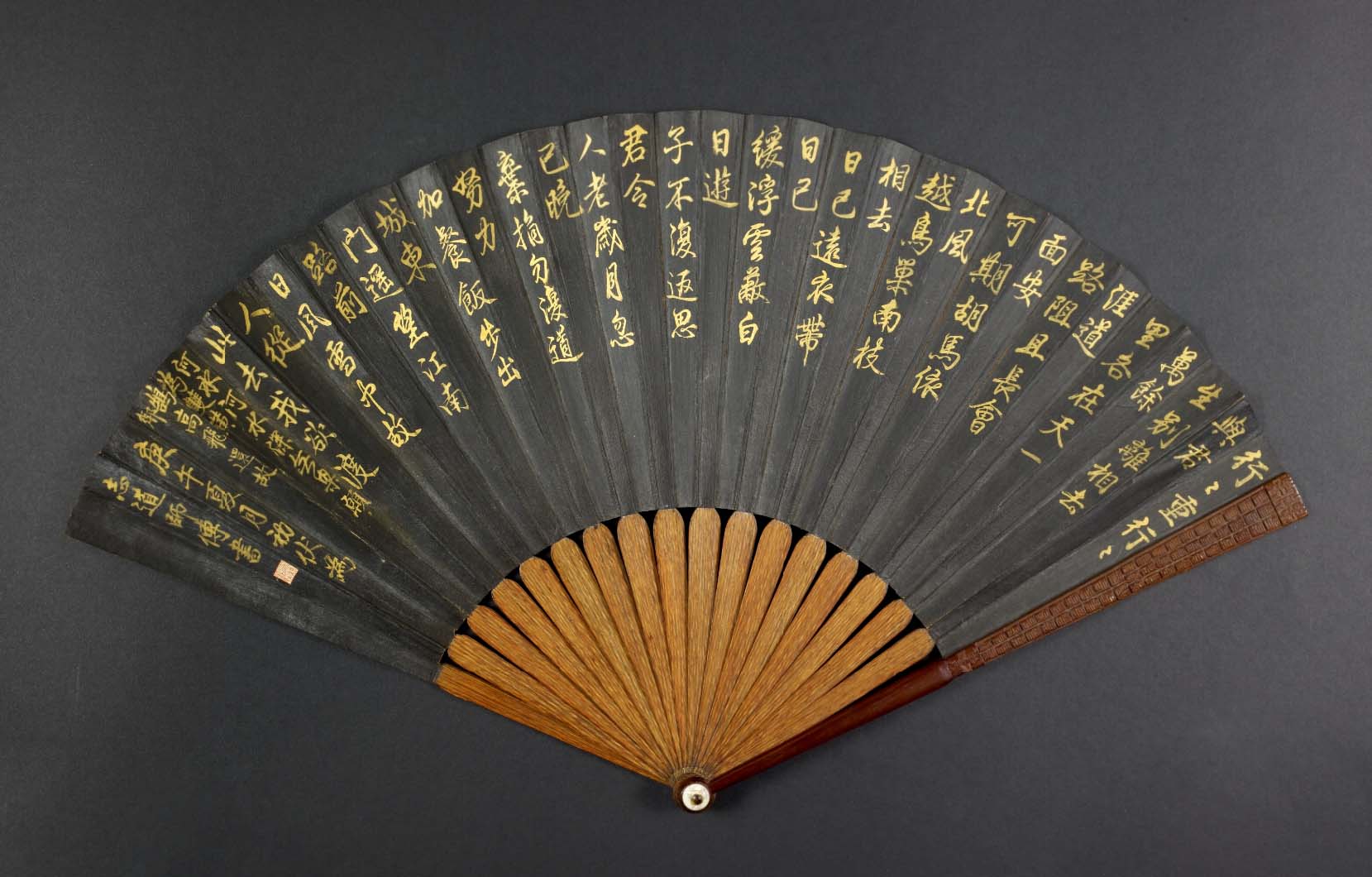
A folding fan presented to Johnston by Puyi, 1925
SOAS, University of London. All rights reserved.
In February 1925, Puyi fled to the Japanese concession area in Tianjin without Johnston's knowledge, and the latter's years as the Imperial Preceptor officially came to an end. In the winter of the same year, the British Foreign Office sent Johnston to Weihai in Shandong to take up a posting. Before taking office, he visited his student Puyi in Tianjin, and the latter presented his mentor with a parting gift inscribed with the following ancient poem:
The road leads ever onward,
And you, my friend, go this way, I go that.
Thousands of miles will part us –
You at one end of the wide world, I at the other.
Long and difficult in the journey –
Who knows when we shall meet again?
The Tartar horses breathe the northern winds,
The birds of Yue build their nests in southern trees.
Our farewells are said, we are far apart;
Already I grow weak with pining.
The sun is hidden by drifting clouds,
The traveller journeys on, turning his head no more.
Thinking of you, I seem to have grown old.
The moths have swiftly passed, a whole year has gone.
It is all over. There is no more to be said,
I must make myself strong for the strenuous days to come.
Written at the end is the sentence "Written for my tutor Zhidau", with "Zhidau" being a Sinicized name for "Johnston".

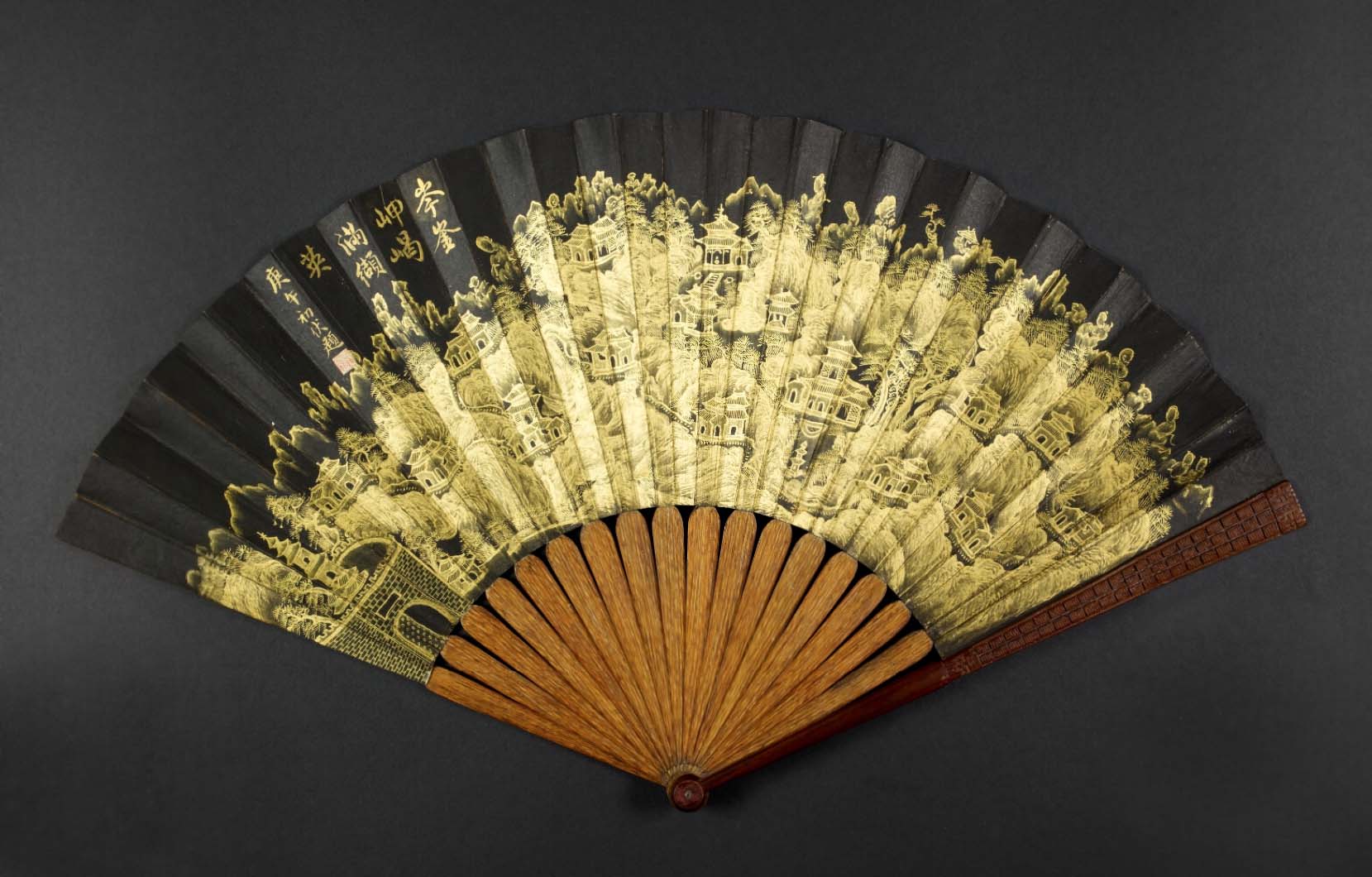
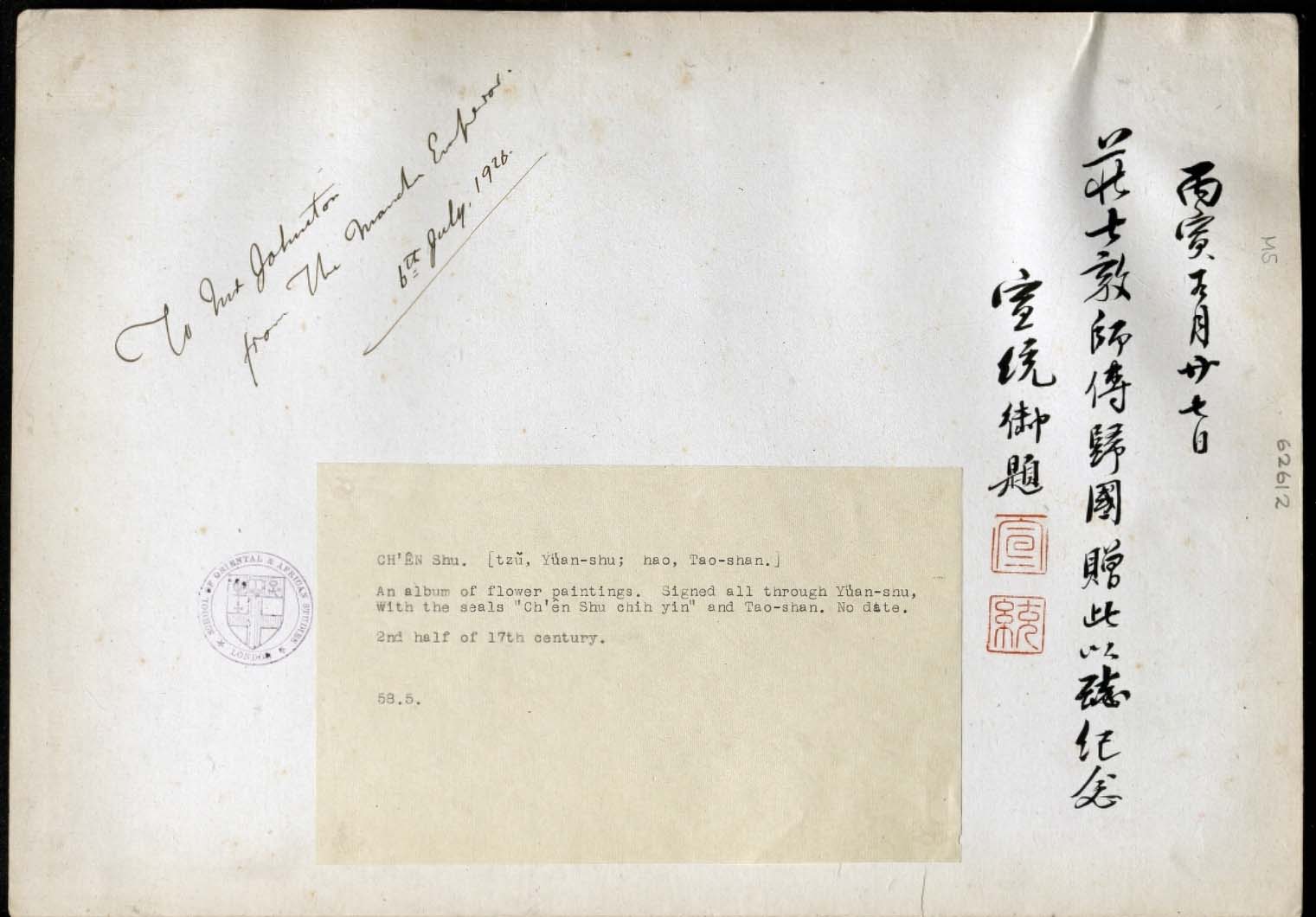
Album of Flowers, Qing Dynasty
SOAS, University of London. All rights reserved.
Puyi also presented Johnston with Album of Flowers by the Qing Dynasty painter Chen Shu (1612-1682). On the first leaf of the album is a painting of a peony, a symbol of wealth and good fortune, expressing Puyi's well-wishes for his tutor.

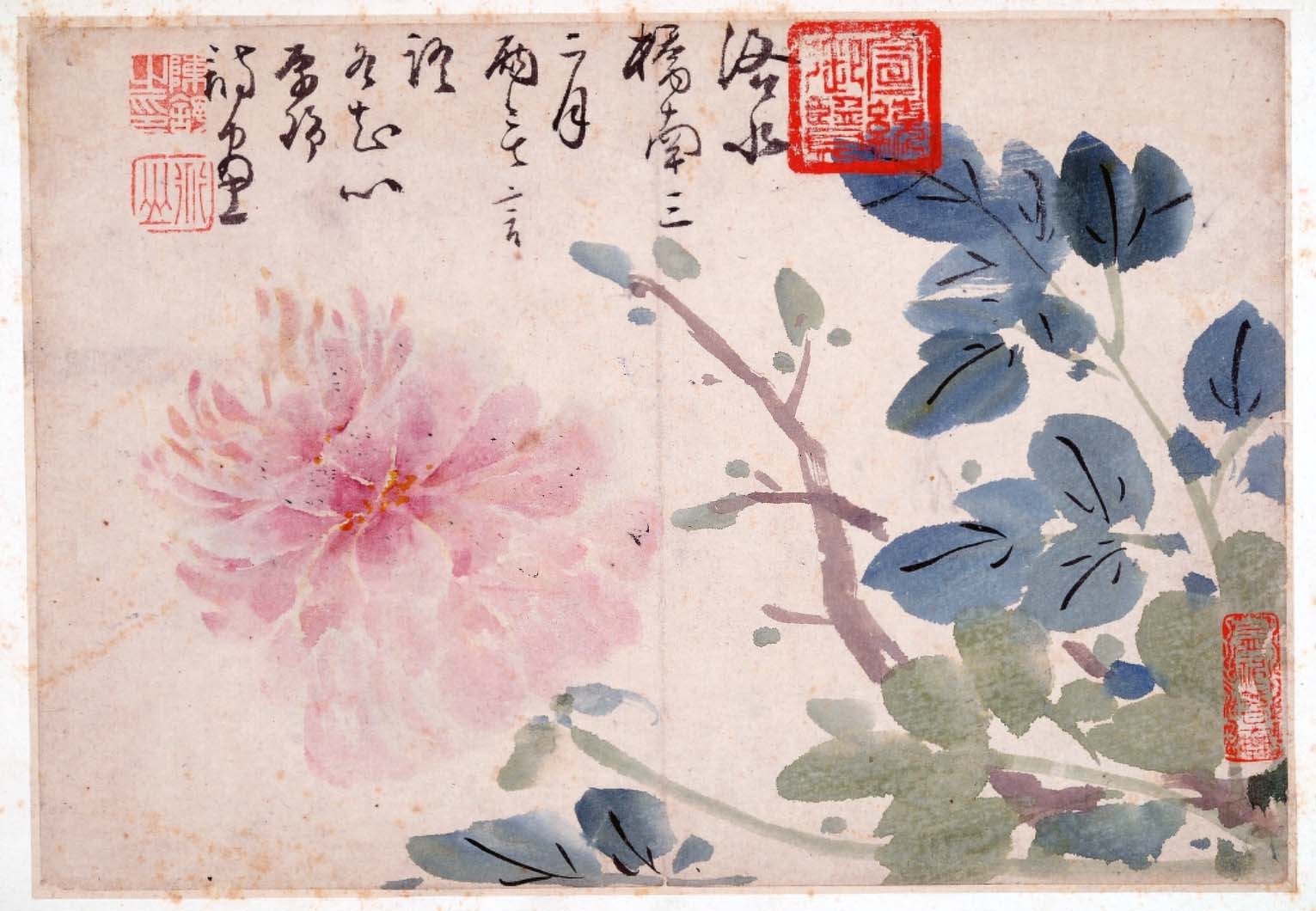

Twilight in the Forbidden City: preface written by Puyi, 1934
Provided by the Palace Museum
Johnston later returned to England and wrote Twilight in the Forbidden City (1934), a first-hand account of life in the Forbidden City. Puyi is mentioned frequently in the book, and Johnston praised him for his aptitude for learning. Puyi personally wrote a preface for him in Chinese and stamped it with a seal that reads, "imperially inscribed by the Xuantong Emperor".
White shoushan stone carved imperial seal of the Xuantong Emperor with a double lion knob.


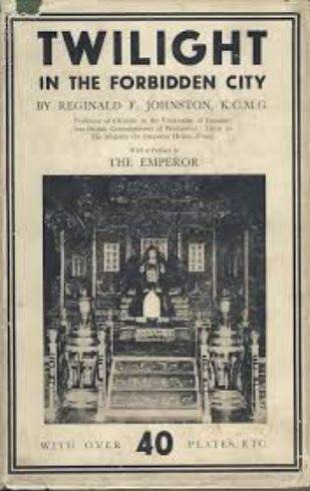
Cover of Twilight in the Forbidden City, 1934
Puyi was reluctant to be seen by foreigners after he was expelled from the palace. However, he still allowed Johnston to publish a photograph of him sitting on the dragon throne at the latter's request when Twilight in the Forbidden City was published. Johnston wrote:
"He had, indeed, a strong objection to being seen—especially by foreigners—in any but the simplest Chinese clothes, and the photograph of himself seated on the dragon throne which is reproduced in this book is, I believe, the only photograph of the kind that he ever allowed to be taken. It was taken at my own special request, to which he agreed with reluctance."








